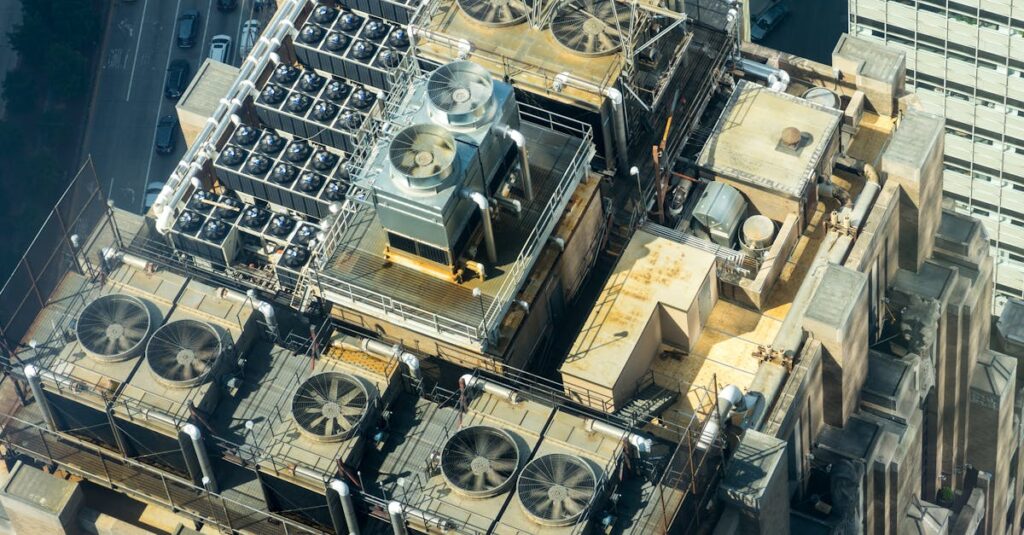When it comes to building the ultimate PC, cooling systems are the unsung heroes. Picture this: your high-performance rig roaring to life, only to be thwarted by the dreaded heat wave. No one wants their gaming marathon interrupted by a thermal meltdown. That’s where cooling systems swoop in like a superhero in a cape, ensuring those precious components stay frosty and ready for action.
From air coolers that whisper sweet nothings to your CPU to liquid cooling setups that look like they belong in a sci-fi movie, the options are as diverse as a buffet of tech treats. Choosing the right cooling system not only keeps temperatures in check but can also elevate your PC’s performance to new heights. So, let’s dive into the world of cooling solutions and find out how to keep your rig chill while you conquer the digital realm.
Table of Contents
ToggleOverview of Cooling Systems for PCs
Cooling systems play a critical role in the performance and longevity of a PC. Several options exist to manage heat, each with unique advantages.
Air cooling systems use heatsinks and fans to dissipate heat from components. These systems generally provide a cost-effective solution for maintaining lower temperatures, especially for mainstream builds.
Liquid cooling offers more advanced thermal management. It utilizes a liquid coolant, which circulates through tubes and radiators to absorb and disperse heat. This method often results in improved performance during overclocking, as it effectively keeps temperatures in check.
Passive cooling systems rely on natural convection and heat sinks without fans. While they represent a quieter option, their performance often falls short under high loads.
Custom cooling loops present another alternative. Enthusiasts often choose these setups to achieve maximum performance and aesthetic appeal. Custom loops, however, require more effort and expertise to install.
When selecting a cooling solution, consider the components involved. High-performance CPUs and GPUs tend to generate significant heat, necessitating more efficient cooling methods.
Budget also plays a vital role in decision-making. Entry-level users might prioritize air cooling for initial builds, while experienced users may invest in liquid cooling for enhanced performance.
Overall, understanding each cooling system’s characteristics enables better decisions for optimal performance.
Types of Cooling Systems
Cooling systems play a crucial role in maintaining optimal PC performance. Understanding the various types of cooling options reveals how they cater to different needs.
Air Cooling
Air cooling systems utilize heatsinks and fans to dissipate heat effectively. These systems are cost-effective and straightforward to install. Users often find them ideal for mainstream builds, where budget constraints are a concern. Commonly, air coolers can handle standard heat loads during gaming sessions. They work efficiently in environments with adequate airflow. Many enthusiasts also appreciate their low maintenance requirements. Noise levels can vary, but most models operate quietly, making them suitable for typical usage scenarios.
Liquid Cooling
Liquid cooling offers superior thermal management for performance-focused builds. This system circulates coolant through a closed loop, transferring heat away from critical components. Overclocking enthusiasts particularly favor liquid cooling due to its ability to sustain lower temperatures. Installation processes can be complex, requiring more expertise compared to air cooling. Custom setups present an opportunity for personalized aesthetics. Various configurations exist, including all-in-one (AIO) units and full custom loops. A well-designed liquid cooling system can significantly enhance overall performance and extend component lifespan.
Factors to Consider When Choosing a Cooling System
Selecting a cooling system requires careful consideration of several important factors. Understanding each aspect helps ensure optimal performance and compatibility with the PC.
Compatibility
Compatibility plays a crucial role in choosing a cooling system. Users must check their CPU socket and case dimensions before selecting a cooler. Air coolers often require adequate clearance for tall heatsinks, while liquid cooling solutions need space for radiators. GPU clearance is also essential for ensuring unhindered airflow. Manufacturers usually provide detailed specifications, which assist in proper matching. Verifying compatibility beforehand prevents misfits and installation challenges.
Noise Levels
Noise levels can significantly influence user experience during operation. Air coolers typically produce more sound due to spinning fans. In contrast, liquid cooling systems may operate quieter, especially when using larger radiators and slower fans. Higher fans often generate more noise, so understanding decibel ratings is essential. Many gamers prefer quieter solutions to enhance immersion while playing. Prioritize the cooling system’s acoustic performance based on personal tolerance for noise.
Performance
Performance remains a top concern when choosing a cooling system. Air coolers generally handle normal heat loads effectively, making them suitable for standard setups. Liquid cooling excels at dissipating heat from overclocked components, providing superior temperature regulation. Users should evaluate thermal performance metrics and compare cooling efficiency. Additionally, consider maintenance requirements since some cooling solutions need regular upkeep. A well-matched cooling system optimizes overall PC performance, prolonging the lifespan of critical components.
Benefits of Effective Cooling
Effective cooling systems significantly enhance overall PC performance and stability. They prevent overheating, which can lead to thermal throttling and potential hardware damage. Maintaining optimal temperatures ensures CPUs and GPUs operate efficiently during demanding tasks.
Improved longevity of components results from appropriate cooling solutions. With reduced heat stress, critical parts experience less wear, extending their lifespan. Users benefit from cooling systems that effectively dissipate heat, allowing for a more reliable gaming or productivity experience.
Enhanced performance during overclocking is another advantage of effective cooling. Users often push their hardware beyond standard limits, generating more heat. Liquid cooling solutions, especially, excel in maintaining lower temperatures, enabling sustained high performance without risks associated with overheating.
Lower noise levels also come with efficient cooling options. Many liquid cooling systems operate quietly compared to traditional air coolers. Gamers and professionals value this stealthy operation, as it contributes to a more immersive experience.
Increased energy efficiency stems from cooler operating conditions. Hardware running at optimal temperatures consumes power more effectively, reducing energy waste. An effective cooling solution can lead to noticeable savings on electricity bills over time.
Some cooling systems offer customizable aesthetics, appealing to users who enjoy personalizing their setups. Liquid cooling setups, in particular, provide opportunities to incorporate unique designs and colorful lighting, enhancing visual appeal alongside performance.
Addressing the critical aspects of heat management ultimately leads to a well-rounded computing experience. Effectively designed cooling systems cater to various user needs, ensuring compatibility with different workloads, budgets, and aesthetic preferences. Each benefit contributes to a more efficient and enjoyable PC operation.
Conclusion
Choosing the right cooling system is essential for any PC build. It directly impacts performance stability and component longevity. Users should carefully assess their needs and preferences to select between air cooling and liquid cooling options.
Air coolers offer a budget-friendly and low-maintenance solution for standard gaming sessions. Liquid cooling systems, while more complex to install, provide superior thermal management for overclocking enthusiasts.
Ultimately, effective cooling not only enhances performance but also contributes to a quieter and more energy-efficient setup. By prioritizing proper heat management, users can enjoy a smoother and more immersive computing experience.





